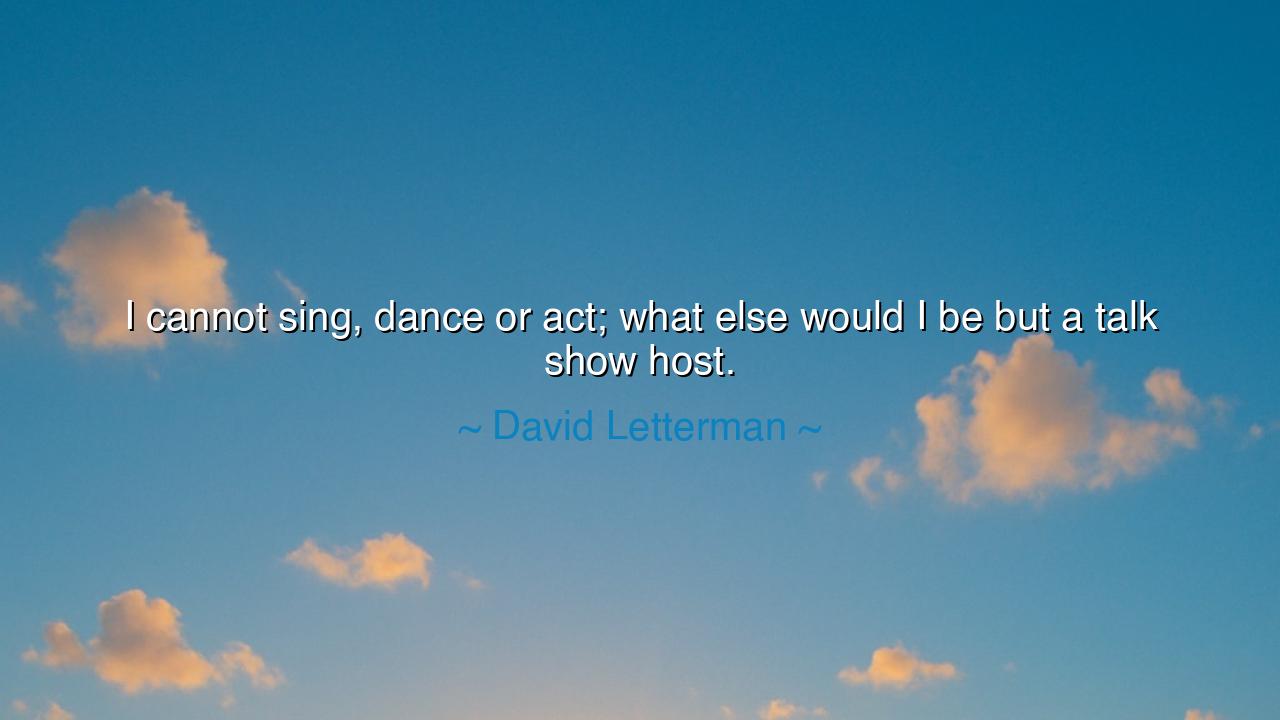
I cannot sing, dance or act; what else would I be but a talk show






In the grand narrative of human existence, there are many paths that one can take, each defined by the choices they make, the talents they cultivate, and the roles they play in the great theater of life. David Letterman once remarked with characteristic humor, “I cannot sing, dance or act; what else would I be but a talk show host.” These words, though seemingly lighthearted, reflect a profound truth about the nature of identity, the limitations we perceive in ourselves, and how we come to define our purpose in a world full of possibilities.
In the ancient world, every individual was often assigned a role based on their abilities—the warrior, the philosopher, the artisan—and it was through these roles that they defined themselves and contributed to the fabric of their society. Socrates, the great philosopher of Athens, for example, did not seek fame through physical prowess or artistic skill, but through the depth of his intellect and his ability to question the very foundations of human knowledge. In the same vein, Letterman’s self-deprecating words reflect the human need to find and accept one’s own role in the vast and often uncertain landscape of life. While he may not sing, dance, or act in the traditional sense, he found his own purpose in the world through humor, communication, and the art of conversation.
The story of Archimedes, the ancient Greek mathematician and inventor, presents a similar theme. Archimedes, though renowned for his intellectual achievements, was not known for his physical prowess or artistic talents. Rather, his genius lay in his ability to perceive and articulate the hidden truths of the world. Archimedes did not follow the traditional paths of fame that others may have sought—he was not a warrior or a ruler, yet his contributions to mathematics and engineering have had a lasting impact. Letterman’s humility, in saying that his talents are best suited for a talk show, mirrors the ancient wisdom that every person has a unique gift to offer, and it is through recognizing and accepting this that we fulfill our roles in life.
Letterman’s quip is also a reminder of the importance of self-acceptance. We often look at others and see their gifts—whether in music, art, or athletics—and feel that our own contributions are somehow lesser. But in doing so, we overlook the value of what we bring to the table. Just as Socrates and Archimedes found greatness in their own spheres, so too did Letterman discover that what might seem like a limitation—not singing, dancing, or acting—was simply an opportunity to embrace his own strengths. In this sense, Letterman’s statement is both humorous and profoundly liberating: we do not have to be all things to all people. Rather, we can excel in the areas where we are most capable, and in doing so, we find our purpose.
The ancient wisdom of Aristotle, too, speaks to this concept. He believed that each person has a unique function—a role that they were meant to fulfill, shaped by their individual talents and abilities. To seek greatness in a field that is not our own, Aristotle argued, is to squander our potential. It is through self-awareness and acceptance that we align ourselves with our true calling. Letterman’s recognition that his talents lay not in performance arts, but in the art of conversation, underscores the importance of discovering and embracing one’s gifts, however unconventional they may seem.
In our own lives, the lesson from Letterman’s words is clear: do not be bound by the expectations of others or the conventional paths that society has laid before us. We are often told that success lies in being multi-talented, in excelling at many things, but the truth is that greatness is often found in the simplest of roles—those that align with our natural abilities and passions. Like Socrates, Archimedes, or Letterman, we must each find our unique role in the world and embrace it with humility and confidence.
The practical action we can take is to reflect on our own strengths and weaknesses, recognizing that true success comes not from doing everything, but from focusing on what we do best. Instead of trying to be someone we are not, we must nurture the talents and skills that we possess, knowing that by focusing on what makes us unique, we are contributing to the world in a way that no one else can. Let us celebrate our individuality and find purpose in the paths that align with our own gifts, whether those gifts are seen as grand or humble by the world’s standards.
Thus, the wisdom of David Letterman echoes the ancient teachings: greatness is not in being everything to everyone, but in embracing our unique calling. Let us not be discouraged by the roles we do not play, but rather, let us be inspired by the roles we were meant to fulfill. In this, we find the deepest fulfillment and contribute to the great story of human existence in our own, irreplaceable way.






AAdministratorAdministrator
Welcome, honored guests. Please leave a comment, we will respond soon